Giải bài này giúp mình cảm ơn nhiều 
NV
Những câu hỏi liên quan
Giải giúp mình bài này vs ạ:(( mình cảm ơn nhiều lắm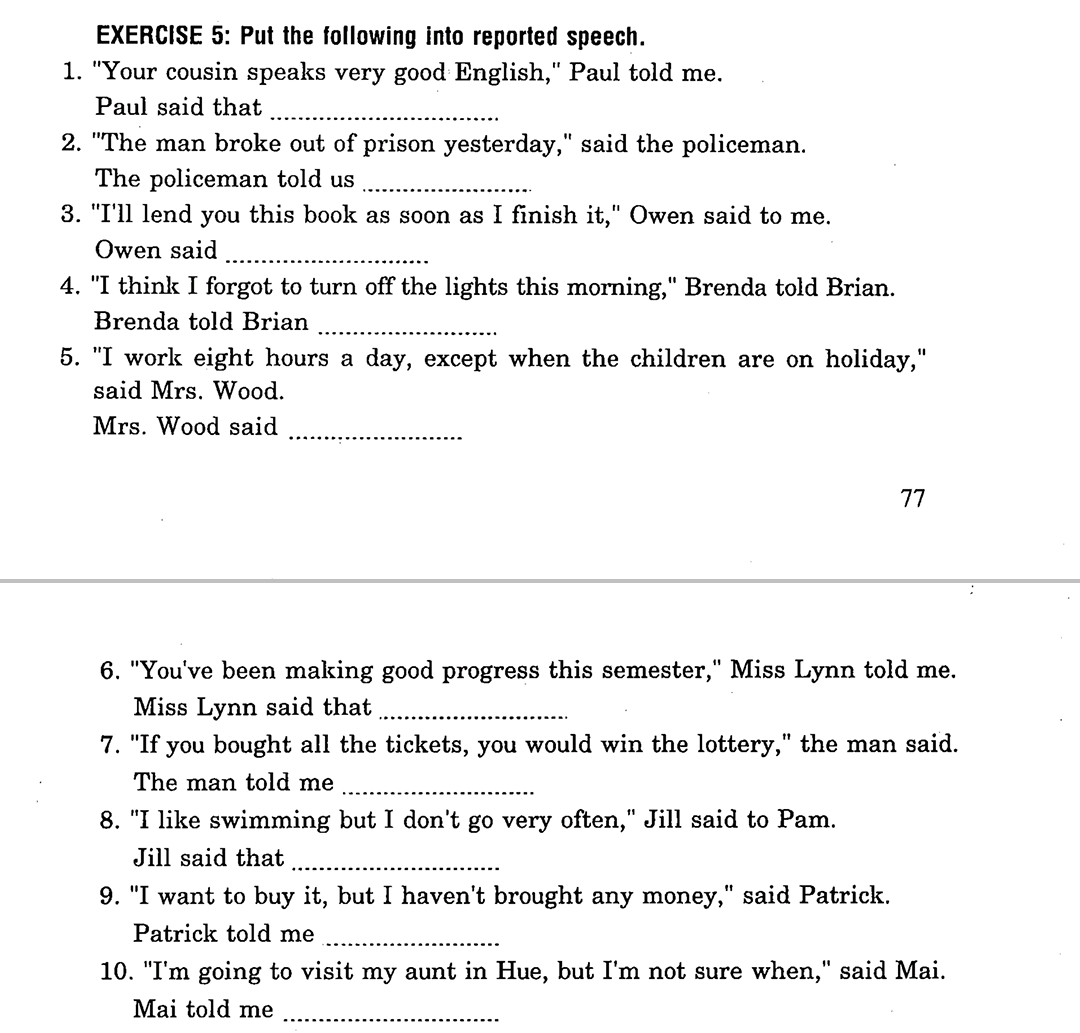
Refer
1. “Your cousin speaks English very well” Paul told me
Paul said that ___________my cousin spoke English very well____________
2. “The man broke out of prison yesterday” said the policeman
The policeman told us_that the man had broken out of prison the day beforr__
3. “I’ll lend you this book as soon as I finish it” Owen said to me
Owen said __me that he would lend me that book as soon as he finished it___
4. “I think I forgot to turn off the lights this morning” Brenda told Brian
Brenda told Brian ____that he thought he had forgotten to turn off the lights that morning.____
5. “I work eight hours a day, except when the children are on holiday” said Mrs. Wood
Mrs. Wood said me that he worked eight hours a day, excepted when the children were on holiday
6. “You’ve been making good progress this semester” Miss Lynn told me
Miss Lynn said that _____I had been making good progress that semester_________
7. “If you bought all the tickets, you would win the lottery” the man said
The man told me ______that If I had bought all the tickets, I would win the lottery______________
8. “I like swimming but I don’t go very often” Jill said to Pam
Jill said that ______he liked swimming but he didn’t go very often___________________________
9. “I want to buy it, but I haven’t brought any money” said Patrick
Patrick told me _________that he wanted to buy it, but he hadn’t brought any money_______________________
10. “I’m going to visit my aunt in Hue, but I’m not sure when” said Mai
Mai told me _________that she was going to visit her aunt in Hue, but she was not sure when__________________
Đúng 1
Bình luận (0)
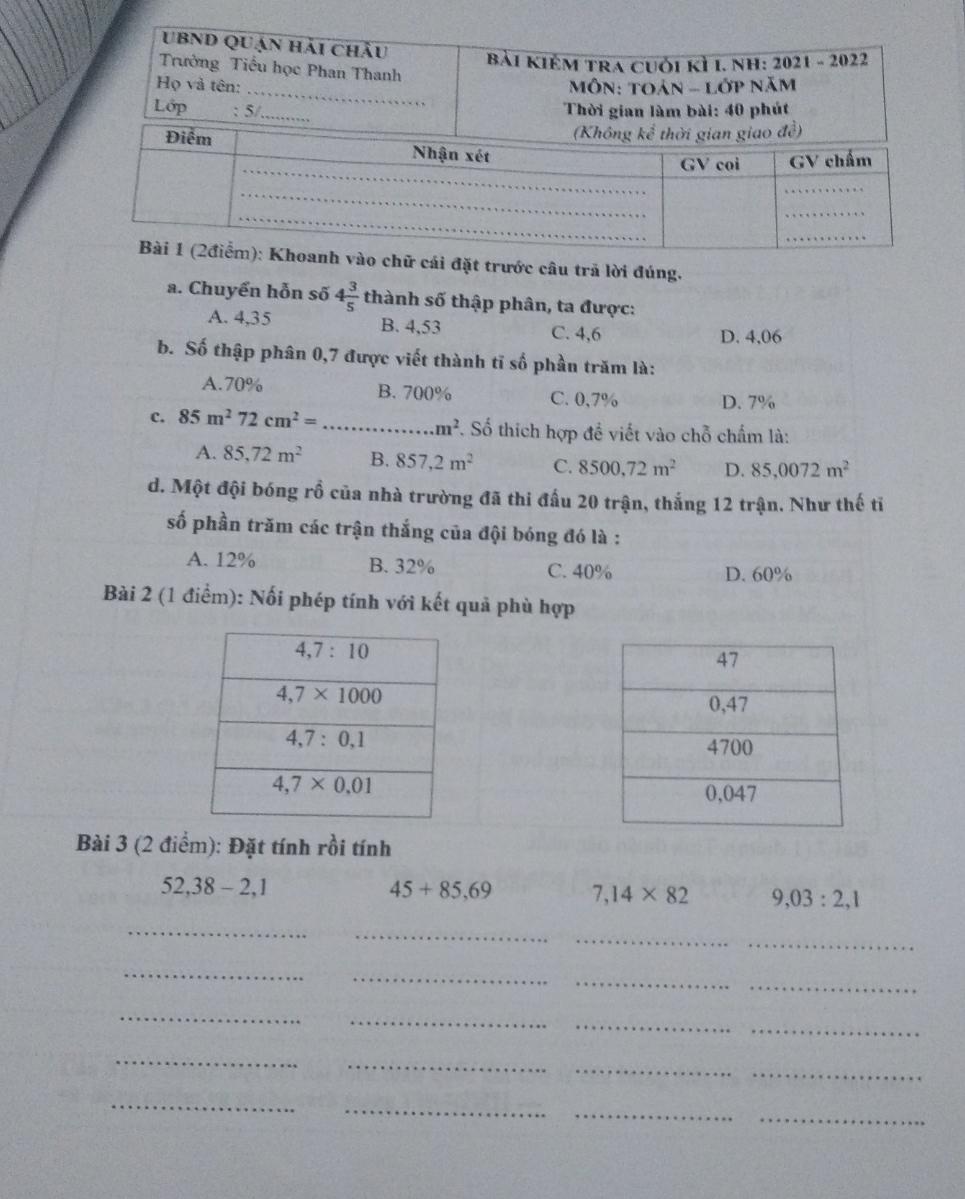 Giải giúp mình bài này nha ( Cảm ơn nhiều ạ )
Giải giúp mình bài này nha ( Cảm ơn nhiều ạ )
Bài 3:
52,38-2,1=50,28
45+85,69=130,69
7,14x82=585,48
9,03:2,1=4,3
Đúng 1
Bình luận (0)
Giúp mình giải mấy bài này với mình cảm ơn nhiều ạ 😁
Bài 1:
Cường độ dòng điện qua điện trở: I = U : R = 12 : 60 = 0,2 (A)
Bài 2:
Điện trở tương đương: Rtđ = R1 + R2 = 3 + 5 = 8 (\(\Omega\))
Cường độ dòng điện qua mạch chính: I = U : Rtđ = 12 : 8 = 1,5 (A)
Bài 3:
Điện trửo tương đương: Rtđ = (R1.R2) : (R1 + R2) = (3.6) : (3 + 6) = 2 (\(\Omega\))
Có: U = U1 = U2 = 12V (Vì R1//R2)
Cường độ dòng điện qua mạch chính và các mạch rẽ:
I = U : Rtđ = 12 : 2 = 6 (A)
I1 = U1 : R2 = 12 : 3 = 4(A)
I2 = U2 : R2 = 12 : 6 = 2(A)
Đúng 0
Bình luận (0)
Các bạn giúp mình giải bài này với ạ , mình cảm ơn nhiều!!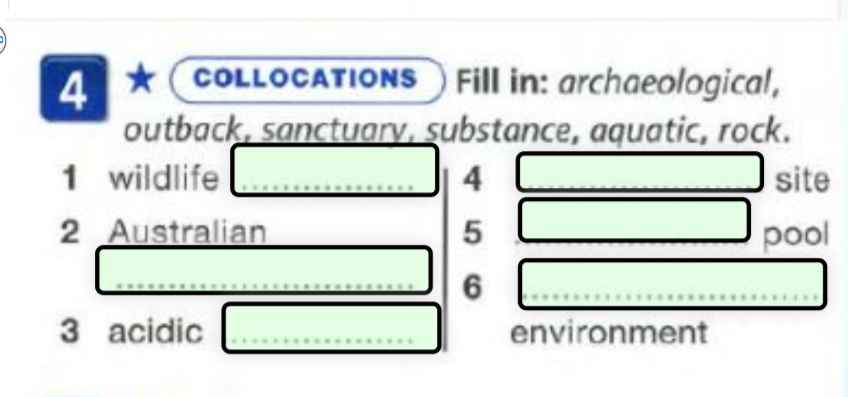
Giúp mình giải 2 bài này với. cảm ơn mn nhiều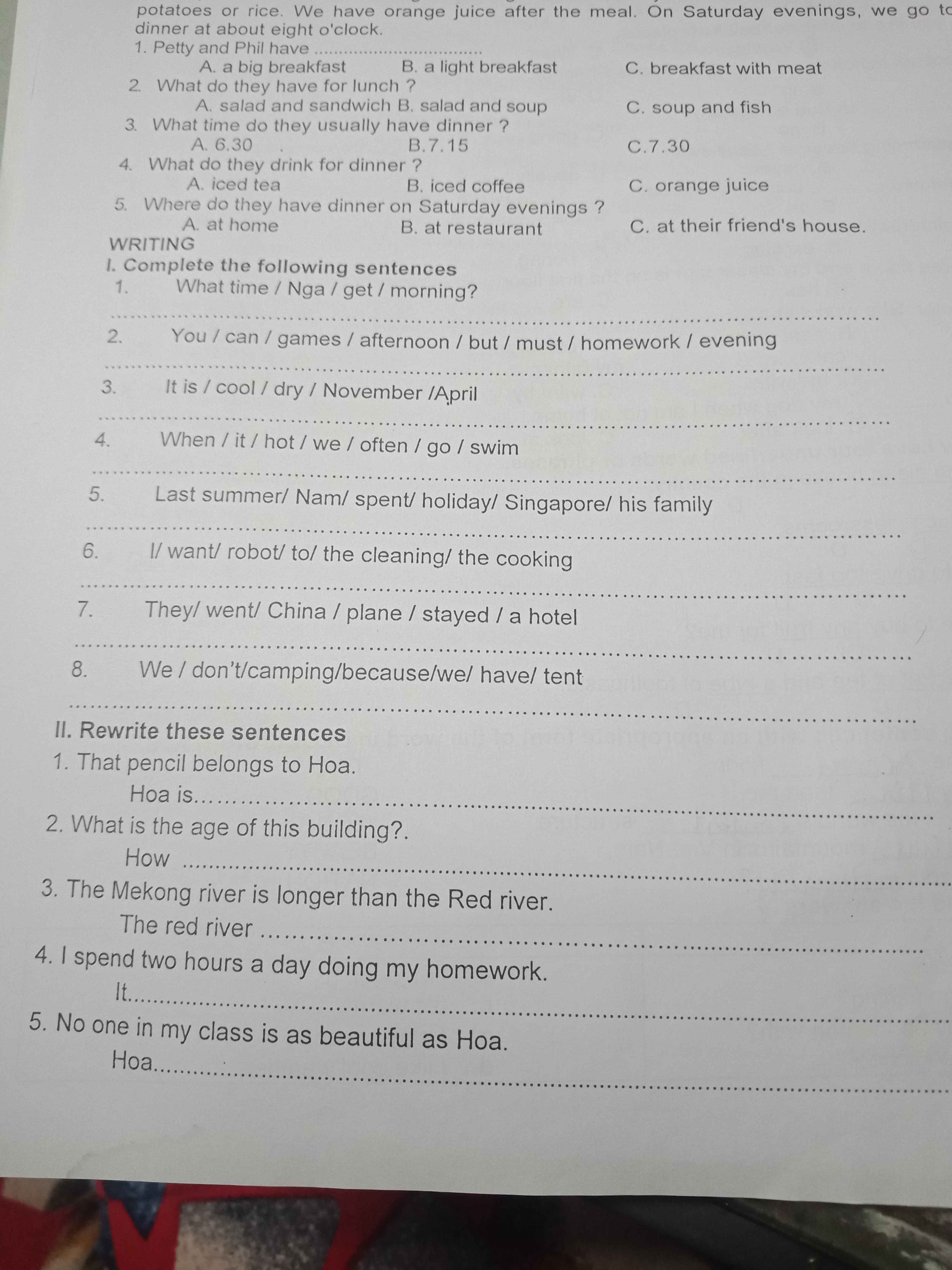

Giúp mình giải 2 bài này với ạ, giải chi tiết dùm mình nhé. Cảm ơn nhiều!!!!
2:
1+cot^2a=1/sin^2a
=>1/sin^2a=1681/81
=>sin^2a=81/1681
=>sin a=9/41
=>cosa=40/41
tan a=1:40/9=9/40
Đúng 1
Bình luận (0)
Huhu giúp mình giải bài này với ạ:((( mình cần gấp
Cảm ơn nhiều
a: Ta có: BC⊥BA tại B
nên BC là tiếp tuyến của (A;AB)
b: Xét (A) có
CB là tiếp tuyến
CD là tiếp tuyến
Do đó: CB=CD
hay C nằm trên đường trung trực của BD(1)
Ta có: AB=AD
nên A nằm trên đường trung trực của BD(2)
Từ (1) và (2) suy ra AC là đường trung trực của BD
hay AC\(\perp\)BD
Đúng 2
Bình luận (1)
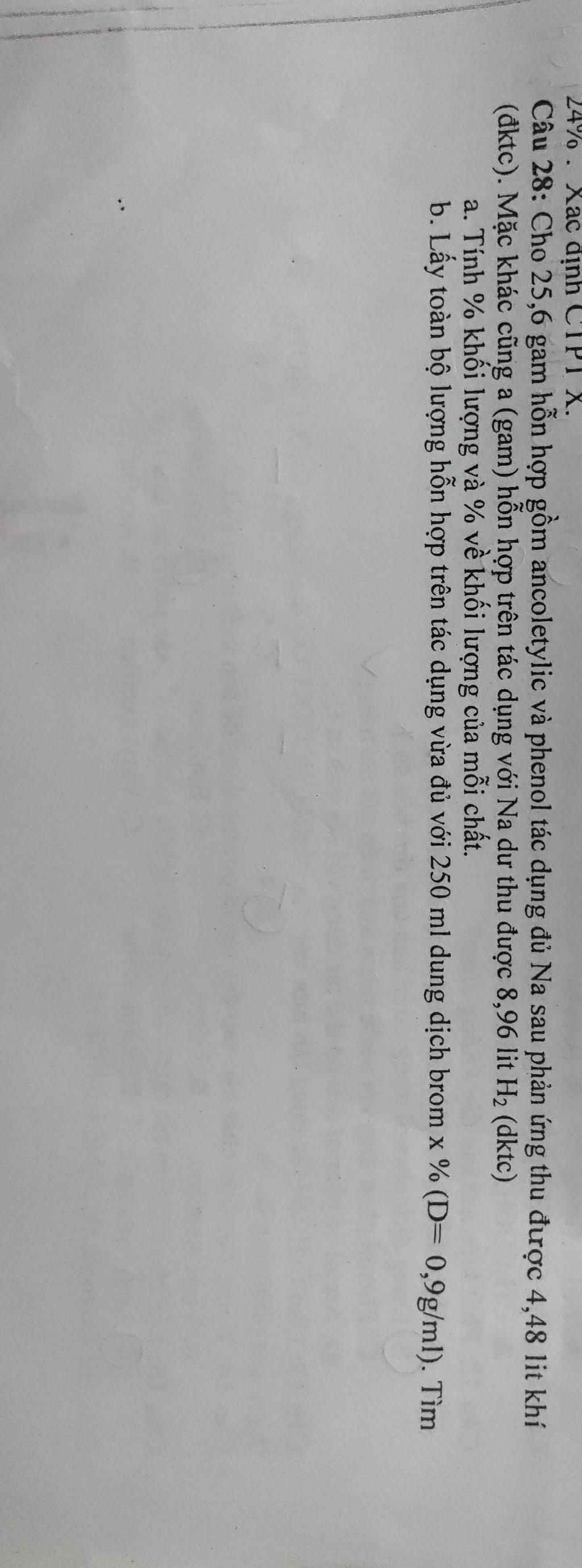
Giải Giúp Mình Câu Này Với, Sắp Nộp Bài Rồi. Mình cảm ơn nhiều!!!
Ai giúp mình giải tự luận bài này với ạ!! Mình cảm ơn nhiều ạ!
Đề bài là: Tính cos2x
Cảm ơn mn nhiều ạ!
Đúng 0
Bình luận (0)
`sin3x sinx+sin(x-π/3) cos (x-π/6)=0`
`<=> 1/2 (cos2x - cos4x) + 1/2(-sin π/6 + sin (2x-π/2)=0`
`<=> cos2x-cos4x-1/2+ sin(2x-π/2)=0`
`<=>cos2x-cos4x-1/2+ sin2x .cos π/2 - cos2x. sinπ/2=0`
`<=> cos2x - cos4x - cos2x = 1/2`
`<=> cos4x = cos(2π)/3`
`<=>` \(\left[{}\begin{matrix}4x=\dfrac{2\text{π}}{3}+k2\text{π}\\4x=\dfrac{-2\text{π}}{3}+k2\text{π}\end{matrix}\right.\)
`<=>` \(\left[{}\begin{matrix}x=\dfrac{\text{π}}{6}+k\dfrac{\text{π}}{2}\\x=-\dfrac{\text{π}}{6}+k\dfrac{\text{π}}{2}\end{matrix}\right.\)
Đúng 1
Bình luận (1)
\(sin3x.sinx+sin\left(x-\dfrac{\pi}{3}\right)cos\left(x-\dfrac{\pi}{6}\right)=0\)
\(\Leftrightarrow\dfrac{1}{2}cos2x-\dfrac{1}{2}cos4x+\dfrac{1}{2}sin\left(2x-\dfrac{\pi}{2}\right)+\dfrac{1}{2}sin\left(-\dfrac{\pi}{6}\right)=0\)
\(\Leftrightarrow\dfrac{1}{2}cos2x-\dfrac{1}{2}cos4x-\dfrac{1}{2}cos2x-\dfrac{1}{4}=0\)
\(\Leftrightarrow cos4x+\dfrac{1}{2}=0\)
\(\Leftrightarrow2cos^22x-1+\dfrac{1}{2}=0\)
\(\Leftrightarrow cos^22x=\dfrac{1}{4}\)
\(\Rightarrow cos2x=\pm\dfrac{1}{2}\)
Đúng 1
Bình luận (0)
Xem thêm câu trả lời



